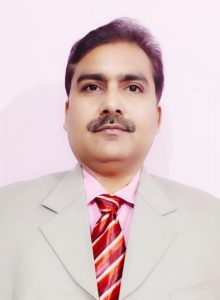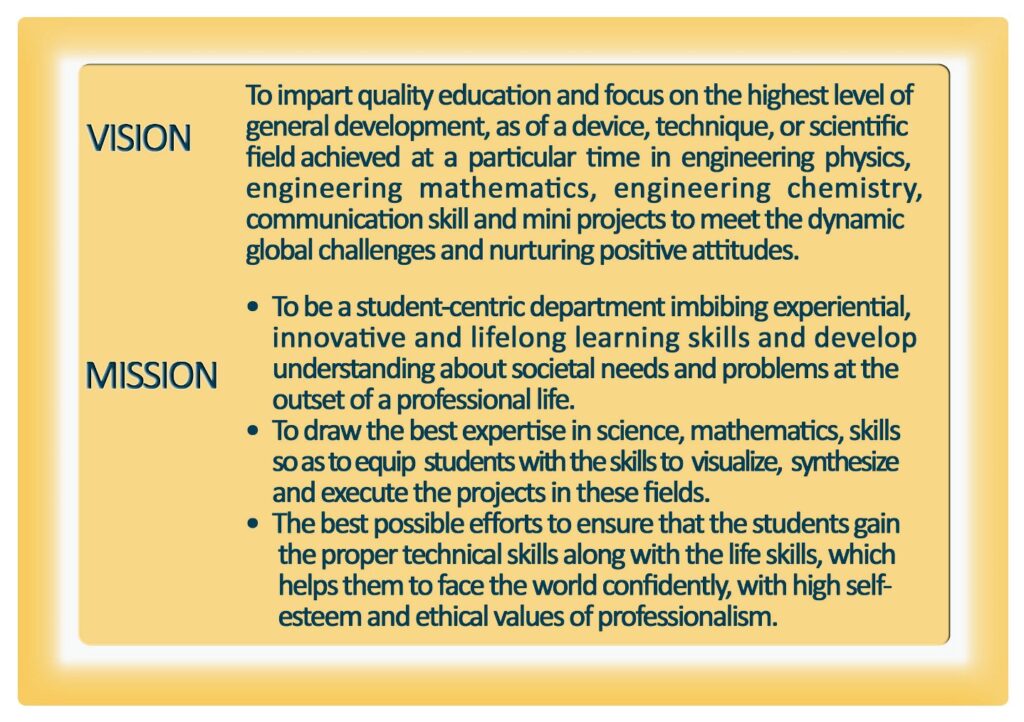About the Department
Established in 2008, as one among the departments of the Faculty of Engineering and Technology, this department participates in B. Tech and M. Tech. programs offered by the Faculty. In addition. The M.Tech program imparts instruction in the basics of engineering science, The program has earned a prestigious position for itself among similar programs available in the country. The department teaches the subjects of Chemistry, English, Mathematics, Physics and Social Science in the B. Tech. programs and Mathematics in the M. Tech programs. We feel ecstatic to introduce you to the Department of Applied Sciences and Humanities, which is the foundation of Engineers. The department strives for increasing the knowledge, enhancing critical thinking, ability to change information into knowledge and the power of analyzing the things technically of every individual of ever-changing society through students. The department is an inseparable part of a vibrant and dynamic institute that guides and gives the faculty members the wholehearted support to nurture engineering students through their academic journey. The department plays a vital role in an engineering college catering to the teaching of Applied Science courses for engineering students of all branches. Our Laboratories have been very well established to cover complete syllabus and motivate students to learn beyond the syllabus, which definitely develops complete knowledge of the subject (both the practical and theoretical depth of knowledge) and develop skill sets of students to become promising engineers in future. English Language Lab and Soft Skills is the distinctive feature of the department which focus on all components of English i.e. listening, speaking, writing and reading along with personality development classes. Our focus is to produce Engineers equipped with modern applied science tools with a strong understanding of the real world of engineering problems. Department of Applied Science & Humanities encompasses and is the footprint to embark the proficiency in the streams of Mathematics, Physics, Chemistry and English. The faculty members adhere to the high standard of teaching and actively involve students in the educational experience. Our faculty members are actively involved in research activities and have published papers in various National / International reputed Journals.
Prof.(Dr.) Shailesh Nath Pandey has been awarded Ph. D. degree in Mathematics from Deen Dayal Upadhyaya Gorakhpur University, Gorakhpur in 2001. The broad area of his research is ” A STUDY OF SHOCK WAVE PROBLEMS ” in Applied Mathematics.The area of his research has wide applications in the field of Engineering.His Research Thesis has been supported by five international good publications. He has completed his M.Sc. degree in Mathematics from DDU Gorakhpur University, Gorakhpur campus in 1994 and has been enrolled for Ph.D degree in 1995 under the supervision of Prof.(Dr.)R.C.Srivastav,
Fellow DAAD(Germany)
Fellow Alexander Von Humboldt Foundation(Germany) General Secretory ISMAMS
Fluid Dynamics and Shock Waves Research Group, Former Head,
Department of Mathematics & Statistics
DDU Gorakhpur University Gorakhpur(U.P).
He has been started teaching during research in 1998.
He has been attended and presented his papers in so many seminars & conferences.
He has also completed Orientation Course, Work Shops and So many FDP programs sponsored by UGC and AICTE.
During his academic journey One Ph.D degree in Mathematics has been awarded under his supervision.

PROF.(DR.) SHAILESH NATH PANDEY
Ph.D (Mathematics)
Deen Dayal Upadhyaya Gorakhpur University,
Gorakhpur
Highlights of the Department
-
Highly qualified and experienced faculties with good research publications in SCI/SCOPUS indexing journals.
-
Online Certification Courses and FDPs from NPTEL, SWAYAM, IIT’s, ATAL, etc.
-
Developing Soft Skills and Personality
-
Enhancing Soft Skills and Personality
-
-
Strong foundation and grooming of students through
-
Induction Program
-
Motivational Lectures
-
Seminars
-
NPTEL Courses
-
Workshops
-
Webinars etc.
-
-
Promoting Participation of students in College / University / State / National / International Level competitions/events.
-
To establish a strong foundation among students Applied Sciences & Humanities plays a vital and pivotal role as it touches the basics of entire engineering subjects.
Laboratory
-
Applied Physics Laboratory
-
Applied Chemistry Laboratory
-
English Language Lab

Program Outcomes (PO)
- Engineering knowledge: Apply the knowledge of mathematics, science, engineering fundamentals, and an engineering specialization to the solution of complex engineering problems.
- Problem analysis: Identity, formulate, review research literature, and analyze complex engineering problems reaching substantiated conclusions using first principles of mathematics, natural sciences, and engineering sciences.
- Design/development of solutions: Design solutions for complex engineering problems and design system components or processes that meet the specified needs with appropriate consideration for public health and safety, and the cultural, societal, and environmental considerations.
- Conduct investigations of complex problems: Use research-based knowledge and research methods including design of experiments, analysis and interpretation of data, and synthesis of the information to provide valid conclusions..
- Modern tool usage: Create, select, and apply appropriate techniques, resources, and modern engineering and IT tools including prediction and modelling to complex engineering activities with an understanding of the limitations.
- The engineer and society: Apply to reason informed by the contextual knowledge to assess societal, health, safety, legal and cultural issues and the consequent responsibilities relevant to the professional engineering practice.
- Environment and sustainability: Understand the impact of the professional engineering solutions in societal and environmental contexts, and demonstrate the knowledge of, and need for sustainable development.
- Ethics: Apply ethical principles and commit to professional ethics and responsibilities and norms of the engineering practice.
- Individual and teamwork: Function effectively as an individual, and as a member or leader in diverse teams, and in multidisciplinary settings.
- Communication: Communicate effectively on complex engineering activities with the engineering community and with society at large, such as, being able to comprehend and write effective reports and design documentation, make effective presentations, and give and receive clear instructions.
- Project management and finance: Demonstrate knowledge and understanding of the engineering and management principles and apply these to one’s own work, as a member and leader in a team, to manage projects and in multidisciplinary environments.
- Life-long learning: Recognize the need for, and have the preparation and ability to engage in independent and life-long learning in the broadest context of technological change.
Program Specific Outcomes (PSOs)
PSO1: Develop the ability to understand, demonstrate, identify, analyze and apply the skills and knowledge gained from foundational courses of Applied Science and Humanities, and relate these fundamentals with core subjects in the relevant field. PSO2: Provide knowledge of modern skills in technology through self-learning in the areas of design, analysis and innovation of scientific and engineering domains. PSO3: On completion of the program the students are well poised to pursue careers in academia, industry and the other areas of Science and Engineering.
Faculty Members
SL.No |
Title |
First Name |
Middle Name |
Last Name |
Designation |
Email-id |
1 |
Dr. |
SHAILESH |
NATH |
PANDEY |
PROFESSOR |
pandeydrshailesh@gmail.com |
2 |
Dr. |
SHAILENDRA |
KUMAR |
SHUKLA |
PROFESSOR |
shailendra.shukla01@gmail.com |
3 |
Dr. |
ANIL |
KUMAR |
BHARDWAJ |
PROFESSOR |
akbh@gmail.com |
4 |
Dr. |
ALOK |
KUMAR |
PROFESSOR |
alokjain1971@gmail.com |
|
5 |
Dr. |
ASHUTOSH |
SINGH |
ASSOCIATE PROFESSOR |
ashu22abi@yahoo.co.in |
|
6 |
Dr. |
PREETI |
POROV |
ASSOCIATE PROFESSOR |
preetiabhas@gmail.com |
|
7 |
Dr. |
MANJU |
SINGH |
ASSOCIATE PROFESSOR |
manjusingh@ambalika.in |
|
8 |
Dr. |
PURSHOTTAM |
KUMAR |
SRIVASTAVA |
ASSOCIATE PROFESSOR |
ppuru84@gmail.com |
9 |
Dr. |
ASHWANI |
SRIVASTAVA |
ASSOCIATE PROFESSOR |
goel.institute@gmail.com |
|
10 |
Dr. |
RAMESH |
YADAV |
ASSOCIATE PROFESSOR |
ramesh.yadav.maths@gmail.com |
|
11 |
Dr. |
ARUN |
DUBEY |
ASST PROFESSOR |
goel.institute@gmail.com |
|
12 |
Dr. |
STUTI |
GUPTA |
ASST PROFESSOR |
stutichemistry@gmail.com |
|
13 |
Dr. |
ANKITA |
SINGH |
ASST PROFESSOR |
mailtoankitasingh@gmail.com |
|
14 |
Mr. |
JAINENDRA |
SINGH |
VERMA |
ASST PROFESSOR |
jsv@gmail.com |
15 |
Mr. |
RANJEET |
KUMAR |
ASST PROFESSOR |
goel.institute@gmail.com |
|
16 |
Mr. |
SHEKHAR |
SRIVASTAVA |
ASST PROFESSOR |
shekhar.gravity@gmail.com |
|
17 |
Ms. |
YASHI |
SRIVASTAVA |
ASST PROFESSOR |
yashi.sri4@gmail.com |
|
18 |
Ms. |
VIDHU |
TRIPATHI |
ASST PROFESSOR |
vidhu2480@gmail.com |
|
19 |
Ms. |
EKTA |
SINHA |
ASST PROFESSOR |
ektasinha2007@gmail.com |
|
20 |
Mr. |
VIKAS |
SRIVASTAVA |
ASST PROFESSOR |
vikas7272@gmail.com |
|
21 |
Mr. |
ABHAY |
PRAKASH |
SRIVASTAVA |
ASST PROFESSOR |
abhay.srivastava831@gmail.com |
22 |
Ms. |
VAISHNAVI |
DWIVEDI |
ASST PROFESSOR |
vaishnavidwivedi01@gmail.com |
|
23 |
Ms. |
PARUL |
SAXENA |
ASST PROFESSOR |
saxenaparul82@gmail.com |
|
24 |
Mr. |
SHANTI |
KESH |
SINGH |
ASST PROFESSOR |
goel.institute@gmail.com |
25 |
Ms. |
SHRUTI |
KALRA |
ASST PROFESSOR |
goel.institute@gmail.com |
